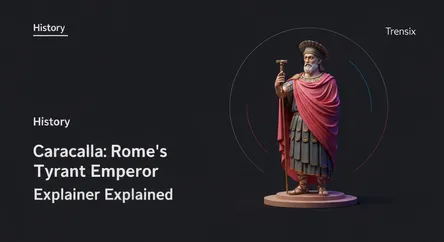History
Caracalla: Rome's Tyrant Emperor Explained

A look into the brutal reign of Roman Emperor Caracalla, known for murdering his brother and yet granting citizenship to all free men in the Empire.
What is it?
Caracalla was a Roman emperor who ruled from 198 to 217 AD, first as co-ruler with his father Septimius Severus and later as sole emperor. Born Lucius Septimius Bassianus, he is known by the nickname "Caracalla," which derived from a Gallic hooded tunic he favored. His reign is one of contradictions, marked by both progressive reform and extreme brutality. After his father's death in 211, he ruled briefly with his younger brother Geta before having him murdered in their mother's arms. Caracalla is also remembered for commissioning the Baths of Caracalla, a massive and ornate public bath complex in Rome.
Why is it trending?
Caracalla remains a compelling historical figure due to the sheer duality of his legacy. He is infamous as a cruel and bloodthirsty tyrant, responsible for the murder of his own brother and the massacre of his supporters. However, his most significant act was the Antonine Constitution (Constitutio Antoniniana) of 212 AD. This landmark edict granted Roman citizenship to nearly all free inhabitants of the empire. This radically transformed Roman society by unifying its diverse population under a single legal framework, a subject of continuous study and debate among historians.
How does it affect people?
The Antonine Constitution had a profound and lasting impact on the people of the Roman Empire. By granting universal citizenship, it erased legal distinctions between the ruling Italians and provincials, creating a more uniform social and legal identity across Europe, Africa, and Asia. While Caracalla's motive was likely to increase tax revenue and the pool of military recruits, the edict fundamentally changed what it meant to be Roman. For millions, this meant new rights and a sense of partnership in the empire, dissolving the old dynamic of conqueror and conquered.